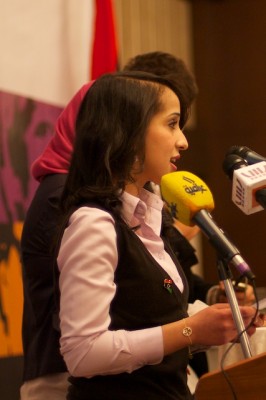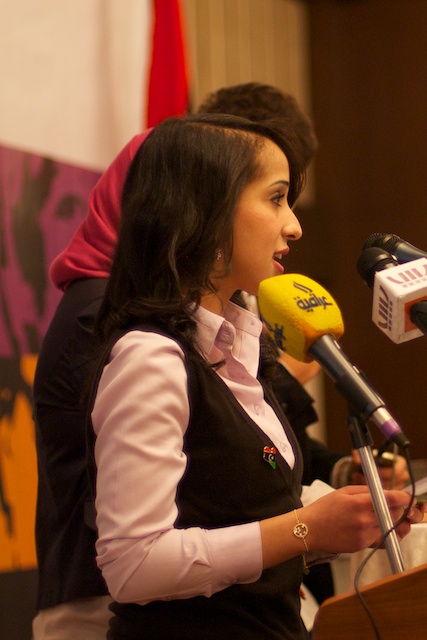
The National Support Group, the Support and Participation of Women in Decision-Making, the “Our . . .[restrict]Families” Association and the Coalition of National Forces celebrated on 10 March the occasion of International Women’s Day at the “Radisson Blu” Mehari Hotel in Tripoli. Among the guests were Mahmoud Jibril, Abdul Hakim Belhadj and the artist Nasser Mizdawi as well as several of the leading figures of the 17 February Revolution.
The three-hour event paid a special tribute and acknowledgment to the deeds of the Libyan woman, saluting her patriotism, strong leadership and support throughout the 17 February Revolution. There were a series of speeches were made by a number of Libyan women. Some shared their sad stories. Others brought out topics and gave emphasis to the importance of women’s rights in Libya and the urgent need to give essential care to Libyan women who played a major role and suffered either by losing their loved ones or by being tortured or killed by Qaddafi’s forces.
Oum Hisham lost her 19-year-old old son on 25 February to a sniper in Fashloum after Friday prayers. Hisham’s death was broadcast on Aljazeera, minutes after he was hit by an anti-aircraft bullet in his head. Oum Hisham also received a call from CNN requesting her to give more details about her son and she didn’t hesitate to describe his bravery to the world. In an emotional speech she told her audience how she had tried to prevent him going out that day, telling him it was too danmgerous but that he ahd replied: “If I die, I will die as proud martyr and if live, then I will live in a free Libya.”
She recounted that after the death of Hisham, “I went out helping to clean the streets of Tripoli, collected trash from the streets, and sewed the independence flags. I participated in every gathering against Qaddafi and barely slept, doing my best to prove to Qaddafi’s forces that Hisham’s blood wasn’t shed in vain and wouldn’t stop me from sacrificing my son’s blood and even more.” Oum Hisham spoke with tears streaming down her face.
Another speech was given by Oum Afrah the mother of a female martyr. Afrah, a 17-year-old girl was supposed to celebrate her wedding this month (March 2012), but she died in Martyrs Square during the celebrations folowing Qaddafi’s death. While she was carrying the flag on her shoulder, singing and expressing her euphoria about Libya’s liberation and Qaddafi’s death, a shot rang out. She died on the spot from a bullet in the heart.
As a blogger and the daughter of a martyr, I had the privilege to be invited to talk about my own father’s death and my experience with the Libyan uprising and share my experiences with the audience.
Abdul-Salam Mohamed Othman Assed, the martyr who was my father, was assassinated by Qaddafi’s regime in 1990 and was found dead in a forest on the outskirts of Tajoura with a bullet in the back of his head. My father’s blood and my mother’s constant prayers and patience encouraged me to risk my life and go to Martyrs Square on 15 February trying to ask everyone: “Why do you like Qaddafi?” The most important things on that day were the hidden answers of people trembling with fear and the cold in their eyes that almost said: “Enough Qaddafi!”
On 21 February, after things in Libya got worse, I decided to take a major risk and anonymously contact the international media — CNN, AC360 with Anderson Cooper. I described to him the atrocious situation and the non-stop killing and shooting of unarmed civilians in my area, Ben Ashour, and let him hear the non-stop gunfire and machine guns that could be heard loud in the Fashloum area.
After the third speech last s given by the mother of a male martyr, the mother of a female martyr, and by me as a blogger and daughter of a martyr, Mahmoud Jibril, the Libyan politician who served as the interim Prime Minister of Libya for seven and a half months during the Libyan war, honored the endurance, hard work and resistance of the martyrs’ families by handing them bouquets of flowers.
The event continued with a moving speech by Ms. Suad Yacoub, a lawyer who holds a Master degree in international law and who is a member of the Women’s Modern Association. As a lawyer, Suad highlighted an interesting idea by urging the importance of taking care of Libyan girls who were assaulted and raped by Qaddafi’s brigades and his mercenaries during the revolution. She emphasized the marvelous efforts made by the Libyan woman in the liberation war. She also talked about the Libyan woman’s endeavors to support relief efforts and her empowerment in shaping the future.
The celebration was concluded by an exciting performance by the famous Libyan musician, Nasser Mazdawi. He subtly criticized the obvious absence of the ministry of culture and its showing the slightest support and appreciation for the Libyan woman and honor her great contributions within Libyan society and during the uprising. “Since this government is led by a temporary administration and not an official and elected one, I will act as if it’s not a big deal but when we have an elected government, I sure there will be a totally different reaction!” Nasser said somewhat sarcastically.
Although the status of the Libyan woman looks significantly different today than it did in the days of Qaddafi, International Women’s Day in Libya is an opportune time when everyone should reflect not only on the great strides that have been made towards Libyan female empowerment during and after the 17 February Revolution, but also on all the work that remains to be done. Libyan women represent a very small number in politics compared to men; women are more likely to suffer from poverty and lack of education than men because they are still not encouraged to constantly educate themselves, seek further learning and face the outside world independently in the same way as men. [/restrict]









